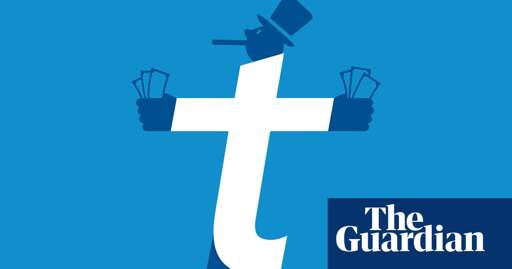You may know the drill. You get online at 10am, several months before the show, and receive a place in the virtual queue. Perhaps you notice with dismay that your number is larger than the capacity of the venue. Perhaps you then lose your place because you’ve been misidentified as a bot, or the site crashes altogether. If you make it to the front, you may well wonder why £100 (plus about £20 in opaque surcharges) now qualifies as a cheap seat. And that’s if there are any cheap seats left, not just inflated VIP packages. And you may ask yourself why it has to be like this.
When you don’t get what you want, you tend to look for someone to blame. That someone is usually Ticketmaster. The company, which merged with concert promoters Live Nation in 2010 to form Live Nation Entertainment, sells about 70% of all concert tickets worldwide, and an even greater proportion of the arena and stadium market. In 2024, Live Nation generated a record $23.2bn (£17.5bn) in revenue, with Ticketmaster selling 637m tickets. Rivals such as See Tickets (owned by Germany’s CTS Eventim) and AXS (the ticketing arm of promoters AEG Presents) aren’t exactly minnows but Ticketmaster has become a synonym for ticketing: a lightning rod and a punchbag.
In the US, Ticketmaster’s current problems stem from a cardinal error: getting on the wrong side of Swifties. In November 2022, the company failed to stagger the presale for Taylor Swift’s Eras tour, listing all 2m tickets simultaneously. The colossal demand overwhelmed the servers, causing myriad problems. Swift expressed her disappointment. Ticketmaster grovelled. Last May, the US justice department (DOJ) filed an antitrust suit, now backed by 39 states, which alleges that Live Nation and Ticketmaster use their “power and influence … to freeze innovation and bend the industry to their own benefit”.



Yes, they have another choice. Don’t go.
Right, because if I don’t buy the ticket to go see Micky Dolenz, no one else will, Ticketmaster will see the error of its ways, and they will change their business practices. And while we’re at it let’s tell dads not to buy tickets to Taylor Swift for their teenage daughters, so no one will go to her concerts. That will change everything.
You live in a fantasy world if you think “Don’t go” is a feasible alternative. If I don’t go, someone else will, and all I’ve done is deprive myself of something that I want to make a point - a point that won’t matter a tinker’s damn to Ticketmaster. There’s no way that there would realistically be a public boycott big enough to make any difference.
I’m absolutely not one for big government, but this is the definition of a monopoly and should be dealt with. But while the CEO of Ticketmaster has three gold toilets, they’ve bought and paid for four golden toilets for those in Congress through lobbying (aka “legalized bribery”), so nothing will be done. So again, it’s pay up or give up something that I want. I don’t buy tickets to events that I don’t care about just to have something to do, but there are acts that I don’t want to deprive myself of just to make a point to Ticketmaster or try to force them to change their ways through boycott. Because neither of those things will make a single solitary difference as long as they have their paid governmental exception.
Come on mate, you could say this about any kind of protest or boycott.
Yes that is exactly how boycotts work. You make a personal sacrifice as a protest against something that’s unfair or immoral.
If you’re not prepared to make a sacrifice, that’s OK, but at least have the honesty to admit you just don’t care enough about this particular issue.
My point was, if I make the sacrifice and don’t go, somebody else will buy the ticket. So it’s not that I don’t care enough, it’s that it won’t make a difference. There simply cannot be enough of a boycott from the general public to make any difference to Ticketmaster’s bottom line. Only government intervention and anti-monopoly enforcement will, and that isn’t going to happen either with politicians in Ticketmaster’s pocket.
In the end I’m missing out on something that could be my last ever opportunity (in the case of the Micky Dolenz concert I discussed earlier), while not losing Ticketmaster a dime.
One family not buying tickets is not going to put a dent in Ticketmaster’s bottom line. I understand the principle, but a total boycott of the majority of live music isn’t feasible. This situation isn’t getting fixed without anti-trust getting involved and since it doesn’t fall under the umbrella of big tech, I highly doubt the current administration will do anything.
Such a cop-out. Every boycott is a personal sacrifice, and every individual participating in a boycott knows that their one purchase isn’t by itself going to make a difference.
You’re missing the point. In this one case a boycott is pretty pointless. Those who can’t afford to go are effectively already boycotting, and those that can afford to go, don’t care about the prices because they can afford it. So how is a boycott going to make a difference? For every show I boycott, there’s two more people ready to buy the ticket and replace me.